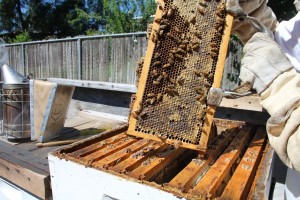A bill that opponents say would allow commercial beekeepers to monopolize bee habitat over the interests of hobbyist beekeepers was held in committee after it drew strong opinions.

Rep. Kay McIff, R-Richfield, is sponsoring HB315, which would regulate beekeepers and separate them into one of three categories based upon the size of their operation. The bill failed to pass a committee March 1. The proposed categories include:
1) Hobbyists, or beekeepers who have less than 20 hives, would be able to locate anywhere in Utah, but must register their location, so that the Department of Agriculture knows where it is and who they are.
2) Sideliners, or beekeepers with up to 100 colonies of bees, would be able to locate wherever they want as long as they are no closer than a half mile to an established commercial apiary.
3) Commercial beekeepers, or beekeepers who own more than 100 colonies, would be governed by a two-mile standard to ensure that there are enough resources and that there isn’t an excessive concentration of bees.
During the committee debate, experts and beekeepers offered strong support and opposition for the bill.
The main concerns seemed to stem from a desire to be protected from large out-of-state apiaries “parking” their bees in the state and effectively using up all the resources, before moving on to other pollinating grounds. Proponents said such practices have caused reduced honey production and made bees fight for resources.
Dr. Jerry Bromenshenk from the University of Montana has 43 years of experience in bee research and education. Bromenshenk explained that bees can fly a mile in two minutes and that anything less than a mile protection wouldn’t keep an area from becoming over saturated with bees. He lauded Montana’s own three-mile rule and supported the idea of Utah developing a set of laws to govern beekeepers.
“Some form of rules and organization serves to protect first and foremost the welfare of bees, and secondly the interest of all parties,” Bromenshenk said.
Beekeepers with smaller apiaries told the committee that they had concerns that larger beekeepers would effectively use the amended law to monopolize bees in certain areas.
“Right now you have all the freedom to move bees. You could lock down a spot with just 16 hives,” said Jerry Stoddard, commercial beekeeper with 1,200 hives from Mapleton in Utah County.
Beekeeper Randy Anderson said the bill would make it difficult for many large apiaries to move their bees without infringing on someone else’s area rights. This could effectively lead to large apiaries reserving vast tracts of land, shutting out all competition in the area and creating a monopoly.
Ultimately, the committee voted unanimously to hold the bill in it’s current form and review it later.
Another bill, HB115, failed to pass the committee before members considered HB315. It would have deregulated beekeeping in Utah by getting rid of the need to register and replacing it with the option to register to receive help and services from the Department of Agriculture and Food.




